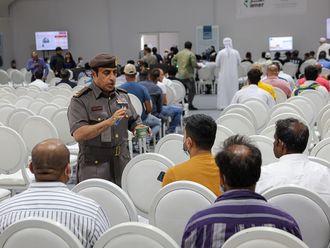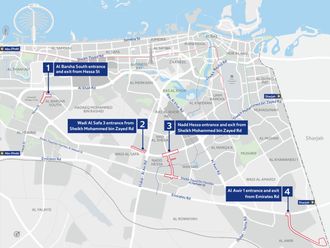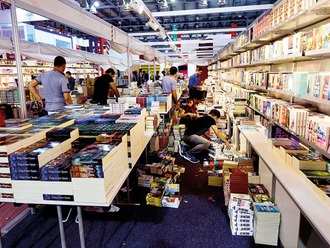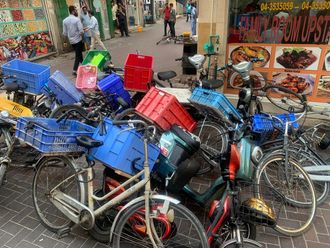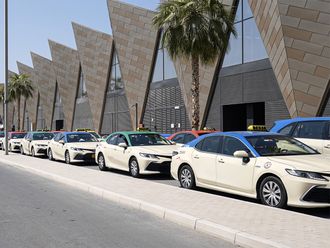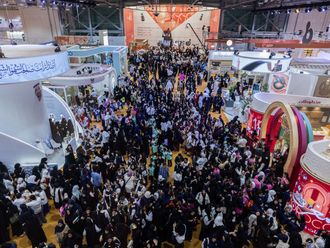Dr Amjad Parvez. ©Gulf News |
An engineer by profession who considers music his life-long passion, Dr Parvez pointed out that singers love to work hard to stage a quality performance – but they cannot succeed without a congenial atmosphere and listeners who understand the music.
He performed recently in the capital in his first concert in the UAE where he sang 'ghazals' (romantic Urdu poetry) and popular songs. Winner of last year's Pakistan's presidential award, the "Pride of Performance", Parvez is known for singing classical, semi-classical and folk songs in South-East Asia as well as many other countries around the world.
"This was my first concert in the UAE and I was surprised to see the interest of people in ghazals and semi-classical music," Parvez said. Parvez has been appearing on Pakistan Television since the very beginning of the channel in 1964. "In my childhood, I was inspired by the singing of Talat Mehmood, a famous Indian singer," he revealed.
His music career started early when he worked as a child artist at Radio Pakistan in Lahore and continued singing in school, college and university. "Folk music was my domain and I tried to give my listeners a different performance. I simplified the folk songs so people could easily understand them. Many of these songs were highly appreciated by my fans," he said.
Parvez has also performed at BBC Radio and Television in the UK and went on to stage concerts in Saudi Arabia, Qatar, Bangladesh, India, Italy, France, Norway and Turkey. "I also did some work on fusion in early 1970, but it was too early and I could not get popular attention."
Known for his ghazal singing, Dr Parvez has sung the compositions of famous Urdu poets such as Asadullah Khan Ghalib, Mir Taqi Mir, Faiz Ahmed Faiz, Nasir Kazmi, Munir Niazi, Ahmed Nadeem Qasmi and Dr Safi Hassan.
The eminent Indian film musician, Khayyam, composed music for his eight ghazals in Mumbai in 1992. "The music and poetry was excellent and all of these ghazals were highly appreciated by people from all over Pakistan and India," he added.
His first album was released in 1983 in Lahore, followed by five others and then another four from England. Though Parvez considers himself a folk and semi-classical singer, he appreciates modern pop music. He says pop music is a totally different breed of music that has a temporary appeal. "Classical music has long-lasting appeal and stays in people's memory forever."
Many of the pop singers, he added, are talented youngsters and they fully exploit the use of modern technology and video effects. In the last few years, they have released many videos. He noted that some youngsters are singing without any formal education in music. "I advise them to learn music as it will enable them to produce quality work."
Parvez acknowledges that learning classical music is very difficult as the experts hold a monopoly over it. "We can see famous music families in Pakistan and India, and they tend to preserve this art within the family."
When Parvez started singing years ago, he had no formal education in classical music, which he says is the base of all kinds of singing. After many years of singing, he realised the need to learn it.
In 1976, he managed to persuade the maestros of classical music in Pakistan, the late Ustad Nizakat Ali Khan and Ustad Salamat Ali Khan, to accept him as a pupil. He also learned classical music from Ustad Ghulam Shabbir and practised it regularly.
"I have sung more than 25 'raags' (musical scales in classical music), 'thumri' (North Indian love songs), geet (popular songs) and ghazals," he revealed. Realising how difficult it is to get people interested in Urdu classical music, he is currently working on a project with the help of a UK-based music firm to produce a set of four CDs to teach classical music.
"It's almost a year we have been working on this project and, hopefully, they will be ready by the end of next year." As an engineer he holds Pakistan's Presidential Gold Medal for his professional achievements.
He has worked for 25 years for the leading Pakistani firm NES-PAK and is vice-president for coordination. His current visit to the UAE is part of a Gulf tour in which he has been to Qatar, where his company plans to open an office.




